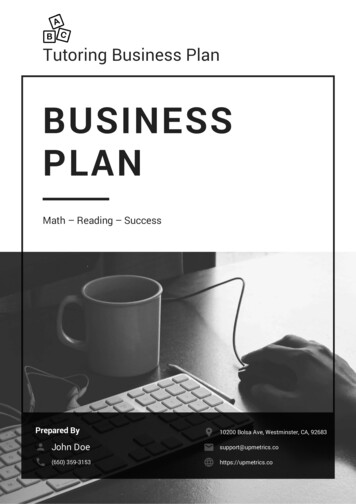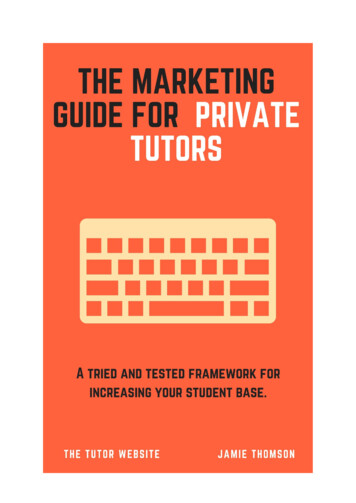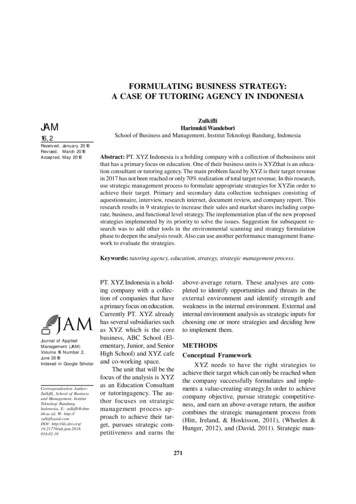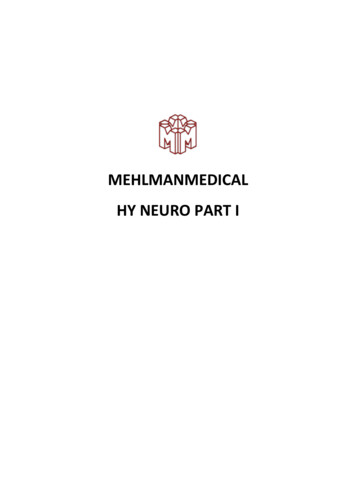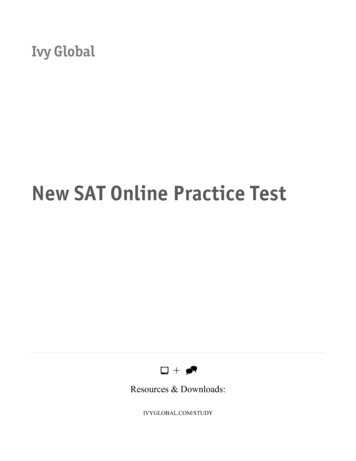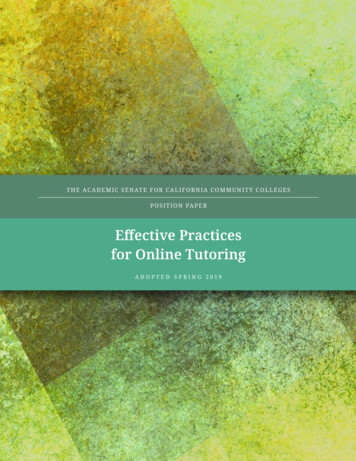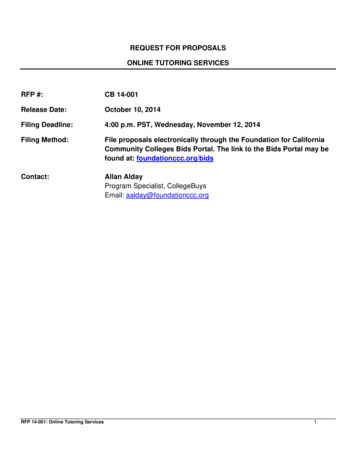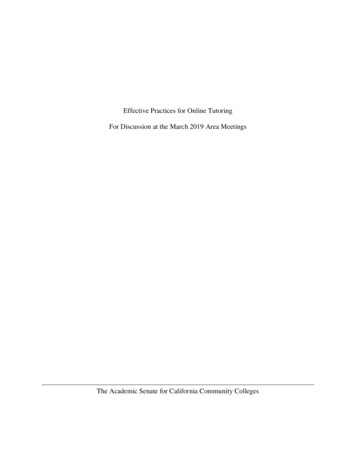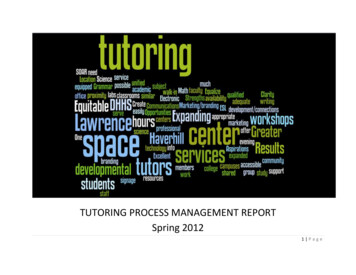
Transcription
TUTORING PROCESS MANAGEMENT REPORTSpring 20121 Page
TABLE OF CONTENTSProject Statement and Core Principles 4Process Management Team Members 5Project Background .5Operational Definitions .6Student Support Flow Chart . 8History and Background .9Analysis of Current Tutoring Services .11Organizational ChartsAcademic Preparation .12Academic Resource & Tutoring Center .13Tutoring Contact Hours . .14Relations Diagram 15Sources of Tutoring Referrals 17Chart .18Definitions .19SOAR Workshops Summary 20Community College Visits . 21Recommendations 22Gantt Chart 24Statement of Appreciation . . 262 Page
AppendicesAppendix A: Community College Interview Questions . 27Appendix B: Interview Summary from Middlesex C.C. . 28Appendix C: Interview Summary from North Shore C.C. 31Appendix D: Interview Summary from Quinsigamond C.C. 33Appendix E: Interview Summary from Bristol C.C. . 35Appendix F: Interview Summary from Bunker Hill C.C. 37Appendix G: Interview Summary from Mount Wachusett C.C. . 39Appendix H: Interview Summary from Springfield Technical C.C. 41Appendix I: Developmental Math Tutoring Center Results 43Appendix J: College Math Tutoring Center Results 433 Page
PROJECT STATEMENTTo improve access to tutoring services by developing a vision of college-wideacademic support To identify immediate and future tutoring needs by analyzing data gathered from faculty andstudent focus groups, interviews, tutoring statistics from TutorTracTo compare and contrast the NECC tutoring services with those at other colleges through sitevisitsTo create a unified plan for tutoring space at both campuses with input from faculty, students,tutoring professionals, and college administratorsCore principlesAssumption: The plan for college-wide academic support will be based upon quantitative and qualitativedata.Assumption: The team’s vision for tutoring services will reflect the visions of NECC’s students, faculty,staff, and administration.Assumption: The team will work toward equity of services at Haverhill and Lawrence campuses, basedupon specific needs of each campus.4 Page
PROCESS MANAGEMENT TEAM MEMBERSTeam SponsorTeam LeadersTeam MembersTeam ResourcesWilliam HeinemanJanice RogersMichael CrossKathy RonaldsonLinda SheaLinda GiampaRebecca RoseLynne NadeauJoseph ScascitelliGisela NashBetsy PardoMargaret PothierColleen WalshPROJECT BACKGROUNDIn August of 2011, the President’s Cabinet endorsed a Process Management team to study tutoringservices at Northern Essex Community College. The sponsor, Bill Heineman, selected leaders whoassembled the team for the Spring 2012 semester. The charge was to analyze how NECC can provide thebest tutoring experience for its students. The team was asked to consider that:1) The process of tutoring for students at NECC can be a highly disjointed one: There isdifferent student support for developmental and college-level classes, the facilities inLawrence are nothing like those in Haverhill, etc.2) The organizational spread of tutoring (Foundational Studies Division, Learning Resources,and perhaps the new Student Success Center in Lawrence) raises questions about whether itis as efficient and effective (or if we can even determine whether it is) as it could be.5 Page
OPERATIONAL DEFINITIONSARTC:Academic Resource & Tutoring Center provides tutoring services for students in college-level courses.Developmental labs:Established to meet the needs of students in developmental and English as a Second Language (ESL)classes. Tutors in the English Language Center work with ESL students. Reading Center tutors addressthe needs of students in Basic Reading and College Reading. The Writing Center tutors students who aretaking Introduction to Basic Writing and Basic Writing. The Math Center supports students in all levels ofNECC math courses.Learning assistance in developmental labs:Students enrolled in developmental courses often have specific assignments or tasks that must becompleted in the labs. This is where they receive the kind of individualized help that generally leads tosolid skill development. They can also visit the labs to get help when they run into difficulties with thematerials in their developmental courses. Learning assistance for developmental courses is provided byprofessional-level tutors.Peer tutoring:NECC students in the ARTC who provide walk-in and small-group instructional support to assist studentsin mastering course content for college-level courses.Professional tutoring:Professional tutors generally have a Masters Degree, and minimally a BA or BS degree with teachingexperience in the targeted discipline. Professional tutors may be adjunct faculty, professional staff, orindividuals working in a field related to the targeted discipline. Developmental tutoring is supplied byprofessional tutors.Study groups:Scheduled meetings of students in a specific class or program, led by an ARTC tutor. Also, informalmeetings among classmates, where students assist each other with assignments, classroom content, etc.Smarthinking:Professional online tutoring services, funded through the ARTC, for students who require tutoring insubjects where, or at times when, face-to-face tutoring is not available.Study-skills workshops:Structured instruction, designed to enhance retention and academic success. Workshops are facilitatedby professional staff or tutors and may include topics such as research-essay assistance, notetaking, testanxiety, learning-style assessment, time management, etc.6 Page
Supplemental Instruction (SI):An academic assistance program for students enrolled in targeted college courses where the focus is onhelping students acquire and refine the skills needed to master the course content. SI study sessions areheld outside of class time and are usually conducted by trained peer tutors (SI leaders), who collaboratewith the instructor. The SI leader attends class sessions and holds study sessions for two hours perweek.TutorTrac:Online tracking software used for recording student visits in each of the tutoring centers.7 Page
STUDENT Support Flow ChartELCAcademic – ARTCReading/Basic WritingNot requiredRequired(Writing, Business,ORScience, Computer Science,Study groups,Supplemental Instructionprogram)Reading CenterIs the coursedevelopmental?NORequiredYESORWriting CenterRequiredMath CenterAcademic and developmentalNot required8 Page
HISTORY AND BACKGROUNDDevelopmental StudiesMuch of the history of tutoring at NECC has been devoted to services for developmental students. TheDepartment of Academic Preparation (formerly Developmental Studies) is a centralized model, in whichEnglish as a Second Language (ESL) and the developmental areas are housed together in onedepartment with a dedicated administrator; this structure has fostered a spirit of cooperation andcollaboration. This model was chosen in the 1990s in response to best-practice recommendations thatare still followed today. Grant funding was secured to establish the Developmental Learning Centers(Math, Reading, Writing, and ESL) with the purpose of supporting the developmental and ESL curricula.Over time most of the funding has been transferred to the college budget.The centers are available to students who need assistance in building a stronger academic foundationand acquiring more skills in order to be successful in college-level courses. The math and writing labshave often supported students in college-level classes as well, because no other college-wide tutoringservices existed. Developmental Learning Centers on the Haverhill and Lawrence campuses provideindividual or group support on either a drop-in or scheduled basis. Professional tutors provide theservices. English Language Center – provides one-on-one tutoring to students enrolled in the college’s ESLclasses, as well as to former ESL students needing assistance in content-area courses. Reading Center – provides tutoring support to students enrolled in the Basic Reading, BasicReading Lab, and College Reading courses. Writing Center – provides one-on-one tutoring to students enrolled in the Introduction to BasicWriting and Basic Writing courses. Math Center – provides walk-in and one-on-one tutoring to students in all levels of mathcourses, as well as workshops and preparation for the Accuplacer test. A mix of professional,paraprofessional, and peer tutors provides services.Academic Resource & Tutoring CenterIn 2005, a Process Management team proposed development of a full-service Academic Resource &Tutoring Center (ARTC) to “provide a comprehensive network of tutoring and supplemental learningservices, all of which are designed to enhance student retention in college-level coursework.” The ARTCwould expand tutoring to support college-level math, science, and English courses, and expand tutoringservices for evening courses and on the Lawrence campus.The ARTC debuted in the Fall 2005 semester, and was thereafter responsible for all college-level tutoringat both campuses. It supports students already enrolled in college-level courses who are looking for9 Page
extra help. At the Haverhill and Lawrence campuses, the ARTC supplies a broad network of instructionalsupport services that includes walk-in tutoring provided by professional and peer tutors, a college-levelwriting lab, study groups, and study-skills workshops. In Haverhill, most services are provided in acentrally located space that is staffed during the day; in Lawrence, the ARTC does not have a designatedspace, so services are provided in several temporary locations.In the summer of 2010, the developmental Math Center and the ARTC’s academic math servicescombined to create a Math Center that supports developmental and college-level math tutoring.Located on both the Haverhill and Lawrence campuses, the centers are staffed by professional and peertutors and have expanded hours for services.10 P a g e
ANALYSIS OF CURRENT TUTORING SERVICESExisting resources and unmet needsThe first stage of the project was to conduct a campus-wide assessment of current resources andservices and to arrange for team visits to tutoring centers at other community colleges. Identify existing tutoring resources, currently being provided on both campuses(Organizational Charts/Contact Hours)Identify key elements of an excellent tutoring process (Relations Diagram)Generate feedback from faculty, staff, and students via SOAR (Strengths, Opportunities,Aspirations, Results) sessions (SOAR Workshops Summary)Examine models for tutoring services at other Massachusetts community colleges(Appendices B – H)Identify strengths and limitations of existing resources (Community College Visits)11 P a g e
Academic Preparation – Spring 2012Janice Rogers, Assistant DeanTammy Foster, Administrative AssistantCollege Success SeminarDevelopmental Math(1 Curriculum Coordinator -seeWriting)Developmental Writing4 FT Faculty(1 Curriculum Coordinator& 1 Department Chair)2 FT FacultyESLDevelopmental ReadingPT Professional Staff Curriculum3 FT FacultyCoordinator (75%)(2 Curriculum Cocoordinators)(1 Curriculum Coordinator & 1CSS Curriculum Coordinator)4 FT Faculty(1 shared with CIT)Math Center (Dev/College)Writing CenterEnglish Language CenterReading Center1 FT Professional Staff Coordinator1 FT Professional Staff1 FT Professional Staff1 FT Professional Staff1 PT Professional Staff CoordinatorCoordinator (Acting)CoordinatorCoordinator(88%)3 AFSCME Day Tutors (51%)3 AFSCME Day Tutors (51%)4 AFSCME Day Tutors (51%)3 AFSCME Day Tutors (51%)1 MCCC Day Tutor (29%)1 MCCC Evening/Sat Tutor2 MCCC Evening Tutors (25%)2 MCCC Evening/Sat Tutor(17%)1 AFSCME Day/Evening Tutor (68%)1AFSCME Day/Evening Tutor (56%)(12%)1 MCCC Evening Tutor (9%)1 MCCC Evening/Sat Tutor11 Peer/Professional Tutors(25%)1 MCCC Haverhill Day Generalist Tutor(23%)(ESL & Reading)1 MCCC Lawrence Evening Generalist Tutor (20%)(Writing, ESL, & Reading)6/1/2012FT position 1,950 hours/year (37.5 hours x 52weeks)12 P a g e
13 P a g e
TUTORING CONTACT HOURSFall 2011HAVLAWTotalWriting CenterReading CenterMath CenterMath Resource CenterEnglish Language CenterAcademic Resrouce & Tutoring 5462457067221771430Total Contact Hours Fall 201112,777535718,134Spring 2012HAVLAWTotalWriting CenterReading CenterMath CenterMath Resource CenterEnglish Language CenterAcademic Resrouce & Tutoring 291473821523921505Total Contact Hours Spring 201210,519590016,14914 P a g e
The Relations Diagram shows the key elements involved in an excellent tutoring process and their causeand-effect relations. Arrow tails indicate root causes, and arrow heads indicate root effects. It is clearfrom the diagram that space is the primary element that, if improved, would have the greatest impacton other aspects of the process, such as staffing and hours, academic and developmentalcollaboration, and equity between campuses.15 P a g e
RELATIONS DIAGRAMArrow Tails Root CauseArrow Heads Root mentalCollaboration4-216 P a g e
SOURCES OF TUTORING REFERRALSThe Process Management team used the technique of brainstorming to determine the varioussources of tutoring referrals on campus. Brainstorming is a technique used to generate ideas on aparticular subject. The team collected ideas from
Tutoring enter (ART) to “provide a comprehensive network of tutoring and supplemental learning services, all of which are designed to enhance student retention in college-level coursework.” The ART would expand tutoring to support college-level math, science, and English courses, and expand tutoring
